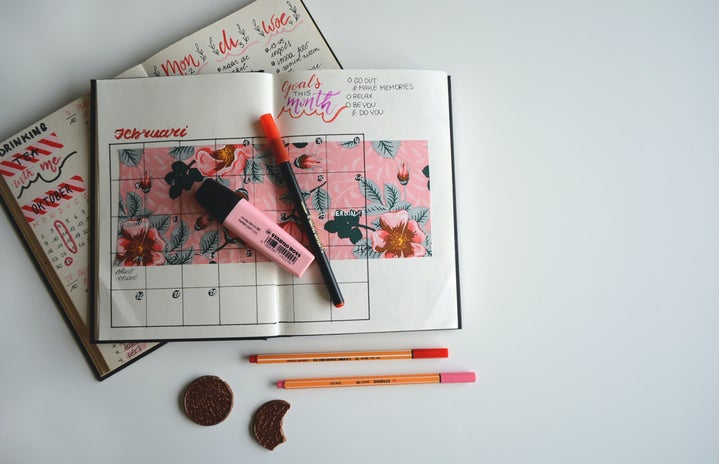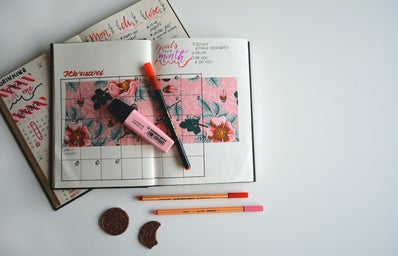I wrote about my view on New Year’s resolutions last year and the social pressure around becoming unrecognizable over the course of the next 12 months. This annual pattern leaves Americans burnt out and generally disappointed in themselves by February. Obliging to completely turn your life around on January 1st is destined to result in some shortcomings and overall is a toxic collective attitude our nation models through capitalistic approaches to resolutions. As a result, intense, full-fledged commitments are a no-go with me. However, setting several strategic goals to improve your quality of life is a definite “yes” here.
Goal-setting and ambition lead to tangible change, motivation, discipline, new attitudes, and to an unimaginably wonderful lifestyle. Life would be excruciatingly boring if we had nothing to look forward to. Consequently, this is my favorite time of the year—when I get to reflect on how far I have come since January and how I would like to alter my life for the upcoming year. This annual habit has improved my mentality regarding failures and rejections and ultimately has fostered my growth mindset.
So, this is my step-by-step guide to achieving everything you desire and more in 2024. It can be effortless and uncomplicated to work towards your aspirations, as long as you lay the foundation for success now.
Write, write, write
Write down all of your goals for next year. Academic, social, career-related, lifestyle—whatever you want to accomplish, write it all down! Follow the SMART outline, the cliché one from middle school: Specific, Measurable, Attainable, Realistic, and Time-bound. The Time-bound category is less necessary, especially if you are looking to accomplish your goals by the end of 2024. Goals need to be detailed—for example, if I wanted to improve my bench press, how would I know next December that I had improved? This could look like: “I want to bench 175 lbs by the end of the year,” or “I want to do 8 reps of 135 lbs.” These are both attainable and realistic goals for myself that include an explicit number. This is a quantitative example of a specific goal, but other statements can be qualitative, such as places to travel to, new hobbies to start, or social activities to attend. Further, scripting is key to reminding yourself of your goals and keeping yourself accountable throughout the next 12 months.
IMAGINE YOUR NEW LIFE
Now imagine that in a year’s time, you accomplished everything on your list. What does this life look like for you? Take each of your goals and write the feelings associated with completing each one. This could look like a mind map or just stick figures of your emotions after finishing your goals. If your goal is to get 8 hours of sleep per night, you will likely feel more rejuvenated, healthier, and more productive. I need to envision Maggie 2.0 in order to become her.
PINTEREST TIME
Set up your Pinterest board. Search for your goals and find images that resonate with you. Oftentimes, I have to use the goal verbatim and the word “aesthetic” to narrow my search to what I would be motivated by. Add anywhere from 25-100 pictures. This step usually takes me a few weeks to complete, and I also add more images to the board as my goals or attitudes change.
OPTIONAL: CANVA IS YOUR FRIEND
If you love Canva like me, might I suggest a vision board? Using the photos you saved on the Pinterest board, create a vision board for your laptop/tablet/phone background—somewhere where you will see your goals every day. My vision board has Pinterest pictures, as well as aesthetic-ish photos of myself and my friends to really envision myself completing the goals I set. I also include statements or quotes that remind me of why I work hard and do the things I do, such as “consistency is more important than perfection,” or “discipline will take you places that motivation cannot.” People who look at my laptop have asked about my vision board and question my images, to which I tell them about this goal-setting process.
Materials and procedures
You are all set up for success—except, do you have the material things or support systems in place to succeed? If you want to work out more, do you have a gym membership or a running route? If you want to earn more money, do you have a plan to get a job or have a passive income? And, do you have motivating people in your life that you can turn to when achieving your goals becomes challenging? I find that discussing my goals with a few close friends makes me feel responsible for working towards these goals. One of my friends and I meet once every few weeks to enjoy some coffee and chat about what we are working on—academically, socially, etc. This has been helpful in keeping me disciplined and feeling inspired.
ACcountability
How will you check in with yourself over the course of the year? Goals can be altered over the course of the year, as people flux in and out of your life or as unprecedented circumstances appear. It’s crucial to check in with yourself every few weeks to monitor your progress. Last year, one of my goals was to read more books, more specifically one book a month. I don’t necessarily love reading and finding the time to do this was always challenging. Last January, I started my goal and was bored by February. I re-evaluated my goal to read when I find downtime. When goals change, the natural reaction is to be harsh on yourself. However, like many things in life, these are your goals—the only person you are competing against is yourself. Directing negativity towards your own “failures,” so to speak, is a waste of energy, and this thought pattern could be redistributed to working towards new goals.
Unlike resolutions with a negative connotation and often short-term results, goals can be long-lasting. Changing habits through this process is a simplified way to improve your lifestyle and foster sustainable action towards becoming the person you envision—You 2.0.


